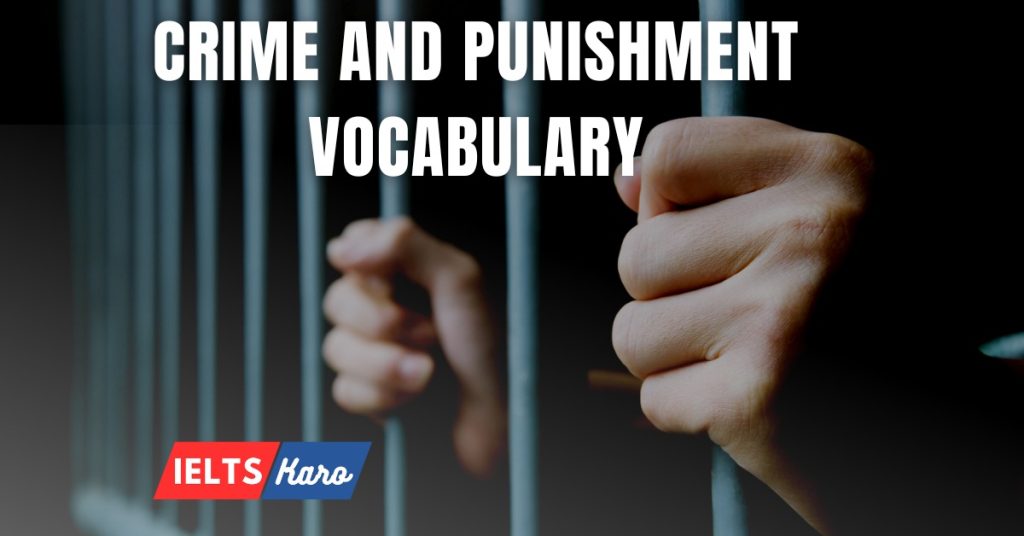Crime and Punishment Vocabulary for IELTS
Crime, and topics related to capital punishment and court proceedings are important and often appeared in IELTS Writing Task 2, Speaking Part 2 and 3, as well as the passages in Reading module.
In this detailed guide, we will explore the vital vocabulary for these topics so that you can build a solid understanding and write great content that results in high band score in the IELTS exam.
Key Crime and Punishment Vocabulary for IELTS
Words with Meanings – Definition and Examples
Here are some of the most common words on crime, punishment and court proceedings with their definitions and examples:
- abduction: To kidnap someone (to take someone without their will and permission)
Law enforcement authorities often struggle with high rates of abduction in their areas.
- Arson: To set a business, building or any type of property on fire
The exact cause of the fire has not yet been determined, byt investigators suspect arson behind it.
- Assault: To attack someone, causing physical damage.
The police imprisoned him for assaulting a celebrity.
- Burglary: Illegal entry to a building for the primary purpose of stealing valuables and artefacts.
Ever since Mr. Hassan has taken over the charge of this area, burglaries have dropped by 15% within 3 months.
- Child abuse: Mistreating minors, often illegal, against their own will and permission.
Employing minors at a business in order to save financial costs is child abuse.
- Drug Trafficking: The illegal business of manufacturing, buying or selling drugs/importing of drugs categorised as illegal.
In some countries like Saudi Arabia and other middle eastern nations, the sentence for drug trafficking is execution.
- False imprisonment: When someone is imprisoned in a false case with no proofs or fake evidences.
False imprisonment of innocent people is a big problem in the justice system of many countries around the world.
- Fraud: To cheat, deceive or mislead someone for a personal and/or a financial gain.
Beware of scammers asking your password, as they are involved in banking frauds.
- Hacking: Getting unauthorised access to computers and highly sensitive and confidential data
The FBI and CIA are continuously probing the biggest hacking attacks on the internet.
- Human trafficking: The illegal business of buying and selling humans from one country to another mostly for slave labour, sexual abuse, or drug abuse.
Human trafficking is a big concern among many nations of the world, and the governments are cracknig down on the ring to bring justice to the innocent victims.
- Murder: Homicide, or the intentional killing of one human being by another with or without any reason.
In many countries, the sentence of committing a murder is execution, or life imprisonment.
- Organised crime: Crime that is conducted by a criminal organisation or a gang in an organised manner.
Organised crime is responsible for more crime than anything criminal-related in the world.
- Money laundering: The organised method in which large sums of money gained from unlawful means such as drug, sex, or human trafficking, is moved from one place to another through a series of layers by injecting funds in a legal source.
Governments around the world are pushing anti money laundering efforts to curb the illegal outflow of foreign reserves.
- Pick pocketing: Stealing wallets and other small items from a person’s pockets.
Be careful when you travel to crowded areas as there are many pick pocketers roaming around.
- Verdict: The final and formal decision of the court.
The court released its verdict; she will be sentenced to 25 years in prison.
- Prison: A building with tall walls, guards, barbed wires and other security measures, that houses prisones serving capital punishment.
Prisons need to be kept less populated as courts should provide speedy justice.
Example Questions and Responses – Speaking Part 1
Question: “Do you remember the last time when you were stuck in a protest?”
Response: “Yes, it was somehwere in December of 2008, when Benazir Bhutto was assassinated, and in a short span of just half an hour, all hell broke loose. We were instructed by our family members not leave our homes and stay indoors as there was a lot of violence that rapidly broke out on the streets.
Question: “Should there be death sentence?”
Response: “I strongly believe that rapists and murderers should not be given any trial and handed death sentence. This will serve as a lesson for criminals.”
Question: “Should young children be sent to prisons for committing crimes?”
Response: “Young children commit crimes because they know the difference between right and wrong. Hence for crimes other than pick pocketing, they should be sent to prisons.
Question: “Do you think video games encourage young people to commit crimes?”
Response: “I strongly believe that children should no tbe exposed to games with violent content and graphic material as it could severely impact their thinking capabilities, and will lead them to committing crimes.
FAQs Related to Crime and Punishment Vocabulary:
What is the difference between major crime and minor crime in IELTS speaking?
Offences like murder and rape fall under major crimes. Whereas pickpocketing, snatching, and minor assault, fall under minor crimes.
How to talk about Crime in IELTS?
Here are some ways you can start a conversation:
1. He may commit a crime by accident.
2. Prison is not the final solution for all crimes.
3. Community service is important to teach juvenile delinquents a vital lesson.
4. The safety of citizens is of paramount importance.





